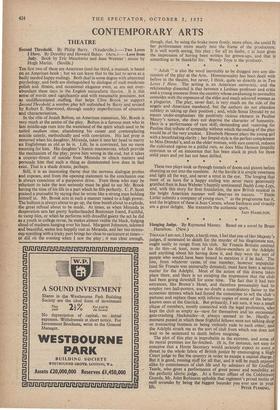CONTEMPORARY ARTS
THEATRE
Second Threshold. By Philip Barry. (Vaudeville.)--Two Loves I Have. By Dorothy and Howard Baker. (Arts.)—Love from Judy. Book by Eric Maschwitz and Jean Webster : music by Hugh Martin. (Saville.) THE first two of these are American (and the third, a musical, is based on an American book ; but we can leave that to the last to serve as a badly needed happy ending). Both deal in some degree with abnormal psychology, and both are distinguished by .dialogue of such moderate polish and fitness, and occasional elegance even, as are not over- abundant these days in the English naturalistic theatre. It is this sense of words used significantly and with reasonable precision, not as undifferentiated stuffing, that helps Clive Brook to support Second Threshold, a sombre play left unfinished by Barry and revised by Robert E. Sherwood, through sundry imperfections of situation and characterisation.
In the role of Josiah Bolton, an American statesman, Mr. Brook is very much at the centre of the play. Bolton is a famous man who in late middle-age runs into the wasteland of the spirit which used to be called luedium vitae, abandoning his career and contemplating suicide calmly, methodically and with conviction. His last prop is removed when his daughter, Miranda, takes it into her head to marry an Englishman as old as he is. Life, he is convinced, has no more meaning for him. His daughter's frantic manoeuvres, which provide the mechanism of the play, prove him wrong in the end, but it takes a counter-threat of suicide from Miranda to clinch matters and persuade him that such a thing as disinterested love does in fact exist. That is a shade drastic, perhaps.
Still, it is an interesting theme that the nervous dialogue probes and exposes, and from the opening statement to the conclusion one is always conscious of a purposive drive. Even those who may be reluctant to take the text seriously must be glad to see Mr. Brook having the time of his life in a part which he fills perfectly. C. P. Scott praised a journalist by saying that he wrote like a strong man holding himself in. Mr. Brook acts in such a manner raised to a high power. The balloon is always about to go up, the time bomb about to explode, the great refusal about to be made. At times, as when Miranda in desperation sets her pretty featherheaded Bostonian friend, Faithful, to vamp him, or when he performs with dreadful gaiety the act he did as a youth in college revue, he makes almost visible the black, bulging cloud of madness hanging over his head. Margaret Johnston, talented and beautiful, seems less happily cast as Miranda, and her too strenu- ous wrestling with a tricky part brings her close to caricature at times— or' did on the evening when I saw the play ; it was clear enough, though, that, by using the brake more firmly, more often, she could fit her performance more neatly into the frame of the production. It is well worth seeing, this play ; for all its faults, it at least gives the impression of having been written for grown-ups, and that is something to be thankful for. Wendy Toye is the producer.
" Adult " is also the word inevitably to be dragged into any dis- cussion of the play at the Arts. Homosexuality has been dealt with before in the theatre, but never, I think, quite so directly as in Two Loves I Have. The setting is an American university, and the relationship dissected is that between a Lesbian professor and critic and a young innocent from the country whose awakening to normality. coincides with the exposure•of the elder and much admired woman as a plagiarist. The play, never fear, is very much on the side of the angels and American manhood, but the authors do not abandon subtlety in taking up their position ; and, while Sonia Dresdel by no means under-emphasises the positively vicious element in Pauline Maury 's nature, she does not deprive the character of humanity. Hers is a performance of rare skill, demanding and receiving for Pauline that tribute of sympathy without which the ending of the play would be of the very crudest. Elizabeth Henson plays the young girl with a breathtaking clarity ; her limpid style is the perfect complement to Miss Dresdel's, and as the older woman, with sure control, reduces the cultivated ogress to a pitiful ruin, so does Miss Henson limpidly convince us of an innocence that has been stuck in pitch for three solid years and yet has not been defiled.
* * * *
These two plays took us through tunnels of doom and gloom before shunting us out into the sunshine. At the Saville it is simple sweetness and light all the way, and never a smut in the eye. The longing that most of us have for a happy ending was never more generously gratified than in Jean Webster's happily sentimental Daddy Long-Legs, and, with this story for firm foundation, the new British musical in the bright American manner well deserves its success. " Emile Littler submits a company of young stars," as the programme has it, and the brightest of these is Jean Carson, whose freshness and vivacity are a great delight. She transmits the authentic spark.
LAIN HAMILTON.


















































 Previous page
Previous page